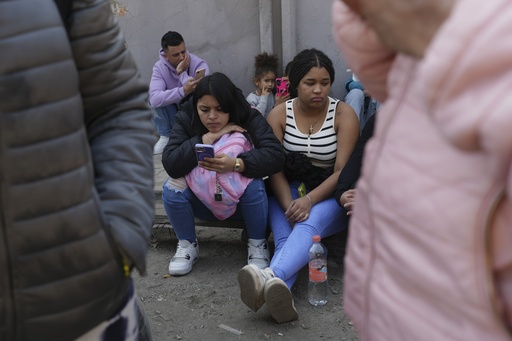
MEXICO CITY — Angelica Delgado embarked on a one-way journey to Mexico in December, fleeing her home in Cuba with the intention of applying for asylum in the United States. However, after the inauguration of President Donald Trump, who implemented policies effectively closing the U.S. border to asylum applicants, the 23-year-old had to reconsider her options.
Delgado and others like her are now contemplating a life in Mexico instead of pursuing their original dreams of entering the U.S. “Our main goal was always to reach the United States,” she remarked. “But now, we have to accept where we are.”
With the new restrictions on asylum imposed by the Trump administration, coupled with further limitations under President Biden’s government, an increasing number of migrants from various countries have shifted their focus towards creating a life in Mexico. Reports indicate that asylum applications in Mexico surged in January, increasing by more than three times compared to the average monthly figures from the prior year. Although Mexico’s refugee agency has not released official statistics for January, there is a growing sentiment among migrants to seek protection within Mexican borders.
According to Andrés Ramírez, former director of the Mexican Commission for Refugee Aid, “All the policies being pushed by Trump are directing more individuals to look for international protection in Mexico.” Outside a refugee agency in Mexico City, Delgado was one of many migrants from Cuba, Venezuela, Haiti, and Afghanistan congregating in response to recent executive orders by Trump that restricted asylum access and increased border militarization.
Many individuals, who had been cleared for asylum appointments in the U.S. through the Biden administration’s CBP One app, found themselves stranded in Mexico after the cancellation of those appointments on Inauguration Day. As they grapple with the harsh realities post-cancellation, several expressed their intentions to apply for asylum in Mexico instead. “It’s now the Mexican dream,” said a Mexican national assisting friends from Haiti with appointment scheduling amid the changing political climate.
Previously, Delgado, her partner, and numerous others had pinned their hopes on the new pathways to legally seek asylum in the U.S. They emphasized their unwillingness to resort to smugglers for illegal entry. The risks of returning to Cuba, especially in light of recent government crackdowns on dissent, greatly influence their decision. “Crossing illegally isn’t an option for us. We would prefer to remain here in Mexico,” Delgado expressed, fearing deportation back to Cuba if they were apprehended in the U.S.
As trained professionals—a doctor and an architect—neither Delgado nor her partner could find work in their fields due to the non-recognition of their Cuban qualifications in Mexico, leading Delgado to wash dishes in a market for now.
Mexico has historically welcomed refugees, but the rise in asylum applications has surged dramatically, increasing from 1,295 requests in 2013 to an astounding 140,982 in 2023. While the numbers dropped to 78,975 in 2024 due to the advantages of the CBP One app, the influx continues to challenge Mexico’s ability to adequately process applications.
Amid mounting criticism regarding the backlog of asylum requests, President Claudia Sheinbaum has significantly increased funding for agencies managing migration and asylum processes.
Harry Luzardo, 37, an asylum-seeker from Venezuela, shared that life in Mexico represents a significant improvement compared to his previous experiences in Ecuador and Chile. These countries, once central to the outflow of eight million Venezuelan migrants, are now facing their own economic difficulties and have tightened their borders. According to Luzardo, “In Chile, you receive no kind of support; there’s nothing for migrants.”
After leaving Venezuela four years ago but failing to secure legal status in Chile, he aimed to reunite with family in the U.S. Now that avenue is blocked, making Mexico a viable alternative. “For now, I feel content here,” he admitted, though he openly preferred to be in the U.S.

